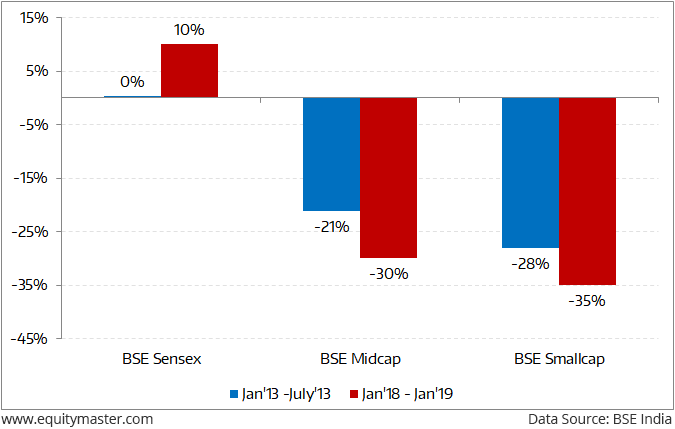- Home
- Todays Market
- Indian Stock Market News February 12, 2019
Sensex Opens Flat; IT & Telecom Stocks Drag Tue, 12 Feb 09:30 am
Asian share markets are trading on a flat note today as investors are looking forward to a new round of Sino-US trade talks as the world's two largest economies try to resolve a tariff dispute that has put a dent on global growth and corporate earnings.
Back home, India share markets have opened the day on a flat note. The BSE Sensex is trading down by 9 points while the NSE Nifty is trading down by 3 points. The BSE Mid Cap index and BSE Small Cap index opened up by 0.5% & 0.1% respectively.
Sectoral indices opened on a mixed note with stocks in the IT sector and telecom sector witnessing selling pressure while power stocks, energy stocks and healthcare stocks are witnessing buying interest.
The rupee is currently trading at Rs 71.04 against the US$.
Speaking of Indian stock markets, note that the current scenario in the Indian stock market looks very similar to 2013.
Back then, mid and small cap stocks witnessed a similar correction while the Sensex stayed put. This is evident in the chart below:
Here's what Tanushree Banerjee wrote about this in the latest edition of The 5 Minute WrapUp...
- 2018-19 has also followed a similar pattern.
Long term-capital gains tax was introduced in last year's budget. We've seen corporate governance issues leading to auditor exits and finally the IL&FS impact.
Also, with elections around the corner, the volatility will probably get worse.
If you're looking at stocks from a short-term perspective, there is a good chance this volatile market will hurt you.
But if you're picking stocks, thinking long-term, the potential for India is huge.
The investor who catches these above trends early, will create life-changing wealth for himself.
PSU Bank stocks opened the day on a mixed note with IDBI bank share price & Corporation bank share price leading the gainers. In a positive surprise, bad loans of public sector banks (PSBs) fell by Rs 311.7 billion to Rs 8,644.3 billion in the first nine months of the current fiscal as against Rs 8,956 billion to end of March 2018.
Reportedly, the bad loans fell to Rs 8,756.2 billion as on June 2018 and further to Rs 8,644.3 billion in December 2018, further underlying that presently the government is not considering any proposal for privatisation of PSBs.
As per the Minister of State for Finance, the fall in Non-Performing Assets (NPAs) also came on the back of the government's 4Rs strategy of recognition, resolution, recapitalisation and reforms. Besides, Asset Quality Review (AQR) initiated in 2015 for clean and fully provisioned bank balance-sheets revealed high incidence of NPAs.
The Minister of State for Finance said that primarily as a result of transparent recognition of stressed assets as NPAs, gross NPAs of PSBs as per RBI data on global operations, increased from Rs 2,272.6 billion as on 31 March 2014, to Rs 2,790.2 billion on 31 March 2015, Rs 5,399.7 billion on 31 March 2016 and Rs 6,847.3 billion as on 31 March 2017.
However, with various steps taken by the government including the initiation of transparent recognition in 2015-16 till December 2018, PSBs have successfully recovered an amount of Rs 3,334.9 billion.
PSBs have had a difficult year, to put it mildly.
While their bad loans struggle has been going on since a decade, there are other issues that have recently cropped up adding to their pile of misery. Bureaucracy and a lack of autonomy have ensured the sub-optimal profitability and asset quality of these state-run banks.
That's the reason we, at Equitymaster have been wary of PSU banks since 2014. This was well before the market had caught a whiff of the NPA problem.
Moving on to the news from aviation space. SpiceJet reported a net profit of Rs 551 million for the quarter ending 31 December 2018, defying the current market conditions, where other airlines are losing money.
The airline said that passenger yields increased by 8% that partially helped offset record high cost due to an increase of 34% in crude oil prices and 11% depreciation of the Indian Rupee against the US dollar.
However, the airline's profit during the quarter fell by 77% over the same period last fiscal, when the airline had registered profits of Rs 2,400 million.
During the quarter, total income stood at Rs 25.3 billion as against Rs 21 billion in the same quarter last year. For the same comparative period, expenses were Rs 24.8 billion as against Rs 18.6 billion.
Despite the huge cost escalation in ATF and exchange rate, SpiceJet has done well owing to good revenue performance, tight control on other costs. With a strong improvement in the macro cost environment and the increasing induction of the fuel-efficient MAX aircraft, the outlook looks stronger than it has over the past year, the company stated.
SpiceJet share price opened the day down by 1.9%.
For information on how to pick stocks that have the potential to deliver big returns, download our special report now!
Read the latest Market Commentary



Equitymaster requests your view! Post a comment on "Sensex Opens Flat; IT & Telecom Stocks Drag". Click here!
Comments are moderated by Equitymaster, in accordance with the Terms of Use, and may not appear
on this article until they have been reviewed and deemed appropriate for posting.
In the meantime, you may want to share this article with your friends!